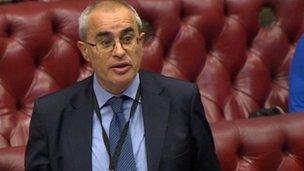100 not out...
- Published
- comments
This week the House of Lords scored its ton - 100 government defeats since the start of the Parliament.
And it's no empty landmark…peers have forced ministers to think again, water down or drop controversial proposals on all kinds of issues since 2010.
They've blocked the abolition of the office of Chief Coroner, and of the Youth Justice Commission, made seven changes to the Welfare Reform Bill, 13 to the Legal Aid, Sentencing and Punishment of Offenders Bill, and, crucially for the next election, delayed the re-drawing of the constituency boundaries in a rare Coalition split vote, which saw Tory and Lib Dem peers whipped against each other. (The details are helpfully collated by the Constitution Unit, here, external).
The most recent clutch of government defeats were on votes to continue to insist on amendments they'd made to the Criminal Justice and Courts Bill, on a series of changes to the rules around judicial review and on keeping under-15s out of the government's proposed new Secure College.
The Commons had rejected the amendments the Lords had made on these issues, and their lordships, in turn, have now rejected the MPs' rejection. So the two Houses have yet to agree on the final form of the bill and it will now hover in legislative limbo until another round of the fabled parliamentary ping-pong is held, after Christmas.
And that delay, of itself, suggests some sort of climbdown is in the offing.

Lord Pannick: whose name induces panic among government whips
In particular, the government was rather startled by the scale of the latest defeat on Secure Colleges - an issue it lost by just one vote back at the report stage of the bill, in October, but where it went down by a rather more emphatic 64 votes on Tuesday
In the Opposition chief whip's pleasant panelled office, Labour's Lord Bassam has allowed himself a modest wave of the bat to mark his ton....Labour can claim a big share of the credit for the defeats because in the Lords the government cannot be defeated without Labour votes.
But they comprise just over a quarter of the House, and to muster a majority, Labour peers must join forces with some combination of crossbenchers, and Coalition rebels. So whipping a government defeat is far more than an exercise in summoning the Labour troops to the division lobbies; it also takes careful diplomacy and negotiation with Tory or Lib Dem rebels and with crossbenchers, who are a major presence in the Upper House.
The crossbenchers are not a party and have no whip guiding them. They are unaligned peers who vote entirely according to conscience. But there are certain issues that bring them out - the formidable number of senior lawyers, including retired judges, on the crossbenches, will often be prepared to defy ministers on issues of legal process and civil liberties.
And particularly if led by the human rights superlawyer, Lord Pannick. The sight of his name on an amendment has chilled the souls of whips from successive governments. To a lesser extent the former Chief Inspector of Prisons, Lord Ramsbotham, can do the same, particularly on prison-related issues, and there's always the former law Lord, Lord Lloyd.
To assemble the kind of rainbow coalition of peers needed to win votes in the Lords, rebel amendments need to be carefully calibrated, must avoid overt partisanship and must be well-argued on the day. And if the proposers get it right, a smart minister will concede the point; and either fold and accept the amendment or offer something in exchange - which is why the number of government defeats understates the amount of leverage the Lords can exert on a government; some defeats are pre-empted by concessions.
And if that's what they can do when faced with a Coalition which can muster a substantial Commons majority and a formidable combined total of peers, imagine what might happen after the next election.
At the moment the polls suggest a much messier hung Parliament, where any government would require shifting multi-party alliances to get its legislation through. In that environment, the leverage of the Lords would be greater, and so might peers' willingness to defy a government with a shaky to non-existent mandate.
In this Parliament, the Coalition has tried to assert that the convention that peers don't wreck legislation promised in an election manifesto (the Salisbury-Addison Convention) should also apply to measures in the Coalition Agreement. I don't think the Upper House bought that, and I don't think it will be very persuadable about the programme of anything less than an outright majority government, next time.
There's already a lot of speculation about what kind of government might emerge from a messily hung House of Commons - but whatever it is, it will also need to get its business through the Lords.
And that is going to be even tougher after next May than it is now.